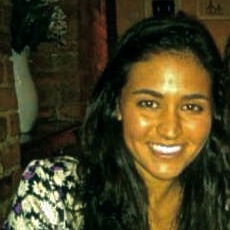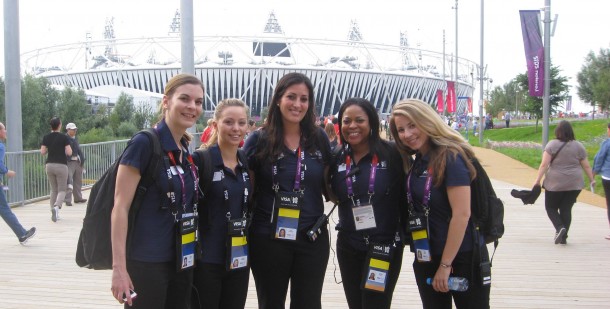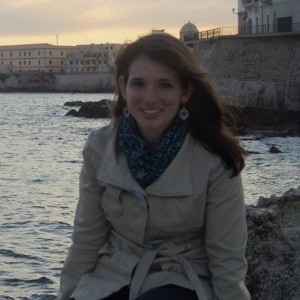Wondering if grad school is right for you? This week, we’re putting together a guide to the grad school experience, brought to you by those who know it best: current students and recent alums. Check in all week for an inside look at med school, law school, PhD programs, and more!
Thinking about getting your master's? In the wrap-up to our Grad School Guide, we sat down with three students and recent grads in three very different programs: Sports Marketing, Education, and Creative Writing.
School: Columbia University
Age: 23
Undergrad: Barnard College
Background Before Grad School: I spent my postgrad year working at Travel + Leisure magazine, where I was an intern and then a digital editorial assistant.
Career Goal: To write and to teach writing at the university level.
Activities/Extra-curriculars: I freelance and I work part-time as a tutor for college applicants and undergraduates.
Why did you choose to get an MFA?
I’ve always wanted to write—but it took a year out of college to come to terms with the fact that I had to write. Before applying to programs, I had in mind a nascent plan for a project I wanted to take on. Spending two years devoting myself to that project—in a creative domain with extraordinary faculty and extremely talented students—seemed like a once-in-a-lifetime opportunity. It still feels that way.
I also want to teach. In academia, the MFA is considered a terminal degree—and it’s difficult to get a job teaching writing at the undergraduate or graduate level without one.
Why did you choose Columbia?
Declaring my status as an MFA student concentrating in nonfiction is almost always followed by the question, Why not just go to journalism school? I did consider J-School for a while. In the end, I wanted to be exposed to forms like memoir and biography and travel writing—not to mention fiction!
I was also interested in learning how to teach creative writing—and Columbia offers a popular “Writer as Teacher” seminar.
Columbia’s New York address, the large university backdrop (I’m required to take classes outside my program, and can even enroll in a class at Barnard), the distinguished faculty in my program—these were all big draws.
What tips do you have for someone applying to your program?
In terms of narrowing down schools, prioritize what’s most important—whether it’s really small class size or scholarship and grant opportunities (some programs are fully funded) or the strength of your concentration (fiction, nonfiction, poetry, literary translation) in the program.
Your writing sample is the most important part of the application. You could have glowing recommendations, you could have been the editor-in-chief of your college’s lit mag—but your competitive edge really rests in the strength of your work. I didn’t apply when I was still an undergraduate because I felt like my portfolio was not strong enough—and that assessment was probably correct.
What’s been the most challenging part of the grad school experience?
Time management. I have chunks of free time, which I didn’t have when I was working at a magazine. I’m learning not to save everything for the day—or hour—before the deadline.
What’s been the biggest surprise?
Having Ian Frazier show up in one of my classes. He was there to discuss his work, which my class was assigned to read that week. Apparently, other students were given advance notice, but since I wasn’t on the email list, his presence was a big, wonderful surprise.
What does your typical week look like?
This semester I’m taking 15 credits, which means I’m up at school for a full day three times a week—either in class or in the library working on assignments. On the Wednesdays and Fridays when I don’t have class, I get up early and spend most of the morning reading and writing. I’m usually tutoring in the afternoons or on the weekend (when I also like to meet up with friends).
What have been your favorite classes?
Right now I’m taking a profile-writing class. For an entire semester, I will be following (stalking) a subject who has kindly agreed to let me in her life and write about her. I’m learning quite a bit about this really demanding form.
What are your ideal post-graduation plans?
Finish and sell my book; teach writing.
Pam Javandel, Master of Arts in Sport Management
School: University of San Francisco
Age: 32
Undergrad: University of California at Berkeley
Career Goal: To find a job that I really enjoy. My ultimate goal is to become a sports marketing executive and run a sports marketing company.
Activities/Extra-curriculars: Member of Women in Sports and Events (WISE) and National Sports Marketing Network (NSMN), on the Organizing Committee of Top Spin Charity.
Why did you choose this type of degree and this program?
I wanted to get a degree that could help me find a career I really enjoyed and a job where I could look forward to going to work each day—and I felt like I could do that in sports. I chose USF because of the location that could lead to future job opportunities and contacts in the sports industry.
What tips do you have for someone applying to your program?
My advice is to know what you want to get out of the program. Many people say they would like to work in sports, but “sports” is a very general term and there are many different function areas, such as sales, operations, marketing, business development, and client services. It is important to know what area you are interested in working in to meet the right contacts and develop the right skill set.
Also, there is very little turnover in sports jobs and it is important to remember that there will be many obstacles to overcome. It’s important to stay patient, dedicated, and focused and to keep your ultimate goals in mind.
What was your favorite part of the experience?
Grad school was a great experience. I met a lot of people who became close friends, had great professors, the classes and networking opportunities were very interesting and relevant, and the contacts were very helpful for jobs opportunities.
What are your post-graduation plans?
I am currently working at a sports marketing agency managing a Fortune 500 client and the global hospitality program for that client at the Olympic Games and the FIFA World Cup. I am also involved in the planning and execution of domestic events including the Super Bowl. My job brings together many things I truly enjoy including sports, travel, and event planning. I am able to use some of the skills I most excel at, including client management and account management, and feel that I achieved my goal of finding a career that I really enjoy.
Hannah Birdsall, Masters in Early Childhood Literacy
School: SUNY Albany
Age: 24
Undergrad: SUNY Geneseo
Background Before Grad School: Fulbright, one year teaching
Career Goal: School Administration, Professor of Education
Why did you choose this type of degree and this program?
I chose a part-time online degree so I could continue my teaching job at the same time. I chose the SUNY Albany program because I was very happy with my undergraduate experience at SUNY Geneseo and wanted to stay in the New York State system.
What tips do you have for someone applying to your program?
Work experience in the field is absolutely necessary.
What do you wish you had known about this program before coming?
So far, I wish I had realized that online classes are isolating—you miss the classmate experience. But you can work on your own schedule, so the trade off is worth it.
What’s been your favorite part of the experience so far?
I have enjoyed the professors and the independent projects. My favorite classes have been those that give me information I can use right away in the classes I teach, such as one class that was all about using literature in the classroom.
What’s been the most challenging part?
The most challenging part is fitting it all in with a busy schedule. The classes themselves have been challenging but interesting and applicable to my job.
What does your typical week look like?
I work from 7-4 then I take a break and do school work from 6-9. Then I work on weekends for about six hours.
What are your next steps?
I will complete my degree in 2013. I then plan to continue teaching to gain more experience and eventually apply to a PhD program.
School: The Johns Hopkins Paul H. Nitze School of Advanced International Studies (SAIS)
Age: 26
Background before Grad School: After undergrad, I worked as an Analyst for the U.S. Department of Defense in the Washington, DC area for three years, which included a five-month deployment to Kabul, Afghanistan.
Career Goal: In the near term, I am interested in working in economic analysis, financial market development, or development economics in Latin America.
Current Activities/Extra-curriculars: While studying in my first year in Bologna, Italy, I worked as a Graduate Teaching Assistant for Micro- and Macroeconomics and ran the Athens Marathon. I was also learning Italian on the side and traveling around Europe as much as I could! Now that I’m back in DC, I have continued working as a Graduate Teaching Assistant in Macroeconomics and may do a part-time internship during my last semester. In my down time, I’m working on improving my salsa skills!
Why did you choose this type of degree?
It was a good fit for my career goals—a master’s in international affairs specifically prepares you for careers that incorporate political and economic analysis on an international level. This fit my exact interests much better than a more theoretical academic master’s program in international relations or economics (which is more for those who want to pursue a PhD) or an MBA program (more for people who want to go into business).
Why did you choose this particular program?
I felt it would provide the strongest coursework in international economics. Johns Hopkins also has a strong language program and I wanted to improve my Spanish language skills (all students must test to proficiency in at least one foreign language before graduating). Finally, Johns Hopkins’ campus selection was a perfect mix for me—it allowed me the opportunity to study my first year in Bologna, Italy, (an amazing experience!) and to return to study in Washington, DC, for my second year.
However, there are many other great master’s programs that are similar with slightly different focuses, including those at Georgetown, Princeton, Tufts, Columbia, Harvard, the London School of Economics, and Sciences Po in Paris, just to name a few.
What tips do you have for someone applying to your program?
I would encourage people to research a lot of programs and gain an understanding of what the key differences are. This research should include reaching out and contacting students (don’t be scared, we are generally really excited to talk to prospective students!).
In addition, I would advise students to think about where they want to pursue future work and plan their education accordingly. For example, if you want to work in New York, going to school at Columbia might make more sense for network-building. You may also be able to do a part-time internship at an organization you want to work with in the future.
What’s been the biggest surprise?
The biggest (and best) surprise for me has been getting to know and making friends with my very interesting and international classmates. In my class alone, there are students from over 70 countries and every continent (save Antarctica—though we do have a classmate that worked on a scientific research expedition there!). Most, if not all, students, have had some experience working, studying, or living in multiple countries and have a varied and rich background in different areas of international affairs ranging from international finance to defense and diplomacy to international development.
What does your typical week look like?
A typical week for me includes 11 hours of class time, 2-3 hours of class review sessions, 5 hours of language study, and 3 hours of leading tutorial review sessions for my classmates as a Macroeconomics Teaching Assistant, Monday-Friday. Outside of those 22 hours, there is a lot of unstructured time for studying and paper writing.
However, there is still a lot of time left to attend speaker’s events, employer information sessions, language conversation hours, and professor’s office hours, and many students also work a part-time job or internship as well. We also have a weekly happy hour on Friday evenings, which is a great way to relax with fellow students after a busy week of classes.
Have your post-graduation plans changed since first started grad school?
My post-graduation plans have done a 180 degree shift since entering grad school. I came to Johns Hopkins expecting to focus my studies on defense and strategic studies and return to work in Afghanistan. However, in the process of exploring different course options, I found myself intrigued by the politics and economics of Latin America. Johns Hopkins has a very strong Latin American Studies Department, with great courses and professors and a fantastic regional summer internship program, which facilitated me making the shift in focus.
What are your next steps?
I’m considering a number of options, including fellowships in Latin America and job opportunities that would incorporate political, economic, or financial work on Latin America. I’m also considering eventually returning to school to do a PhD program in economics in the slightly longer term.




